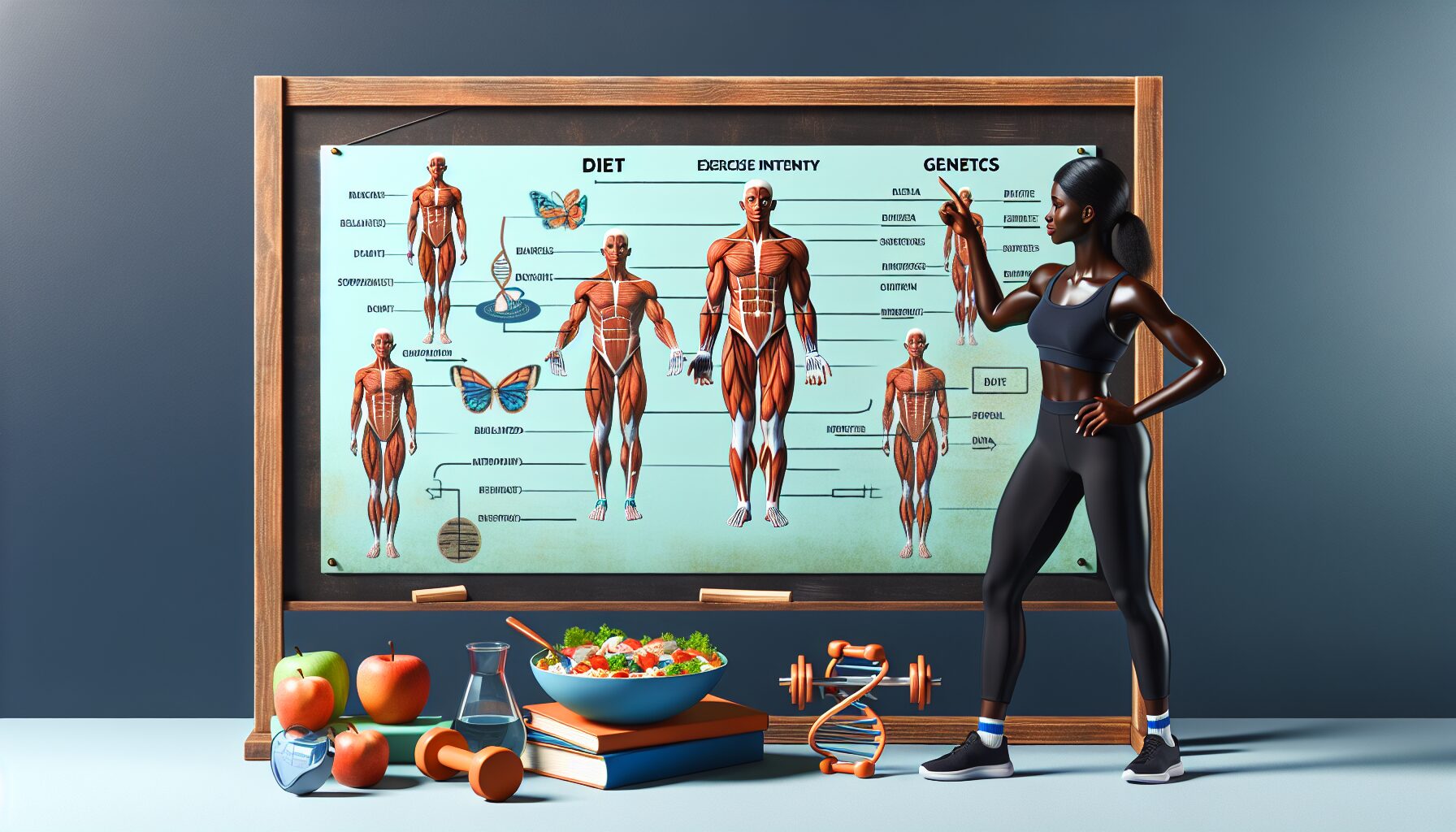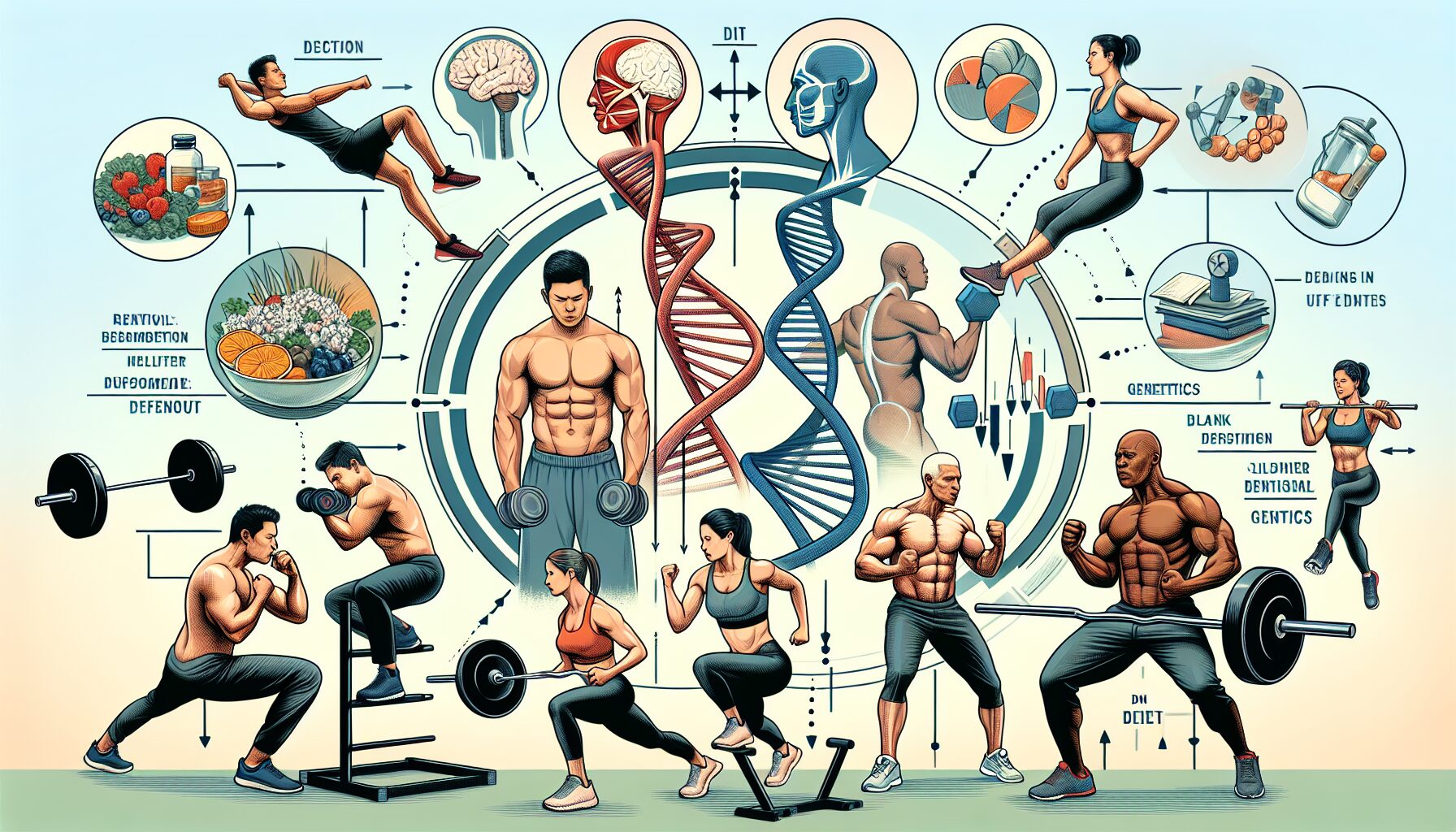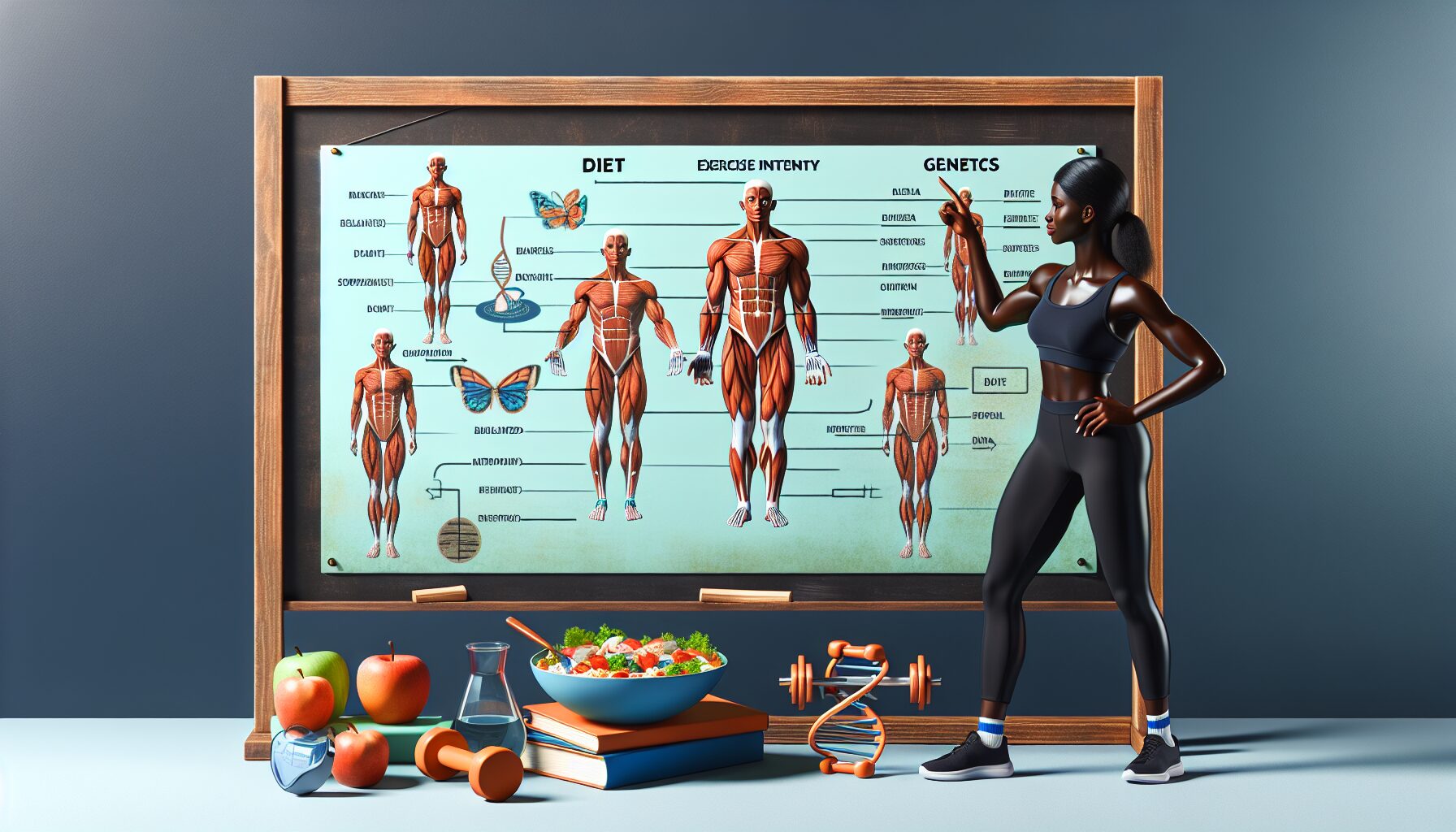Have you ever wondered if it’s possible to achieve muscle definition in just two weeks? It’s a common question asked by many individuals who are eager to sculpt their bodies. In this article, we will explore whether or not it is realistic to expect noticeable muscle definition within such a short timeframe. So, let’s delve into the topic and see what the facts have to say.

Factors Affecting Muscle Definition
Genetics
When it comes to achieving muscle definition, genetics play a significant role. Some individuals naturally have a higher predisposition to develop muscle mass and definition, while others may struggle more. This is because our genetic makeup determines factors such as muscle fiber composition, metabolism, and how our bodies respond to exercise and nutrition.
Body composition
Body composition refers to the ratio of muscle, fat, bone, and other tissues in our bodies. Having a lower body fat percentage is crucial for visible muscle definition. Even if you have well-developed muscles, they may not be readily visible if they are covered by a layer of excess fat. Therefore, achieving muscle definition requires both building muscle and reducing body fat.
Diet and nutrition
Your diet and nutrition play a crucial role in defining your muscles. Consuming a balanced, nutrient-rich diet that provides appropriate fuel for your workouts is essential. Adequate protein intake is especially crucial for building and repairing muscle tissue. Additionally, monitoring your calorie intake and macronutrient balance is important to ensure your body is getting the necessary nutrients for muscle growth and definition.
Exercise routine
To achieve muscle definition, you need to incorporate a well-rounded exercise routine that includes both resistance training and cardiovascular exercise. Resistance training, such as weightlifting or bodyweight exercises, helps build and strengthen muscles, while cardiovascular exercise helps burn calories and reduce body fat. The inclusion of both types of exercises is essential for sculpting and defining muscles.
Rest and recovery
Rest and recovery are often overlooked but are equally important factors in achieving muscle definition. During rest periods, your muscles repair and rebuild themselves, leading to muscle growth and improved definition. Additionally, quality sleep is essential for muscle recovery and overall health. Giving your body enough time to recover between workouts is crucial in avoiding overtraining and promoting muscle definition.
Understanding Muscle Definition
What is muscle definition?
Muscle definition, also known as muscle tone or muscle definition, refers to the visible separation and definition of individual muscles in your body. It signifies a low body fat percentage and well-developed musculature. Achieving muscle definition involves reducing body fat and increasing muscle mass, resulting in a leaner and more defined physique.
How is it achieved?
Achieving muscle definition requires a multi-faceted approach. It involves a combination of strength training exercises to build muscle mass, cardiovascular exercises to burn calories and reduce body fat, and a proper diet to support muscle growth and fat loss. By consistently following a well-rounded exercise routine and maintaining a balanced nutrition plan, you can work towards achieving muscle definition.
Body fat percentage and muscle definition
Body fat percentage plays a crucial role in muscle definition. To have visible muscle definition, you need to have a low body fat percentage. As mentioned earlier, even if you have well-developed muscles, they may not be visible if they are covered by a layer of fat. Therefore, reducing your body fat through a combination of exercise and nutrition is key to achieving muscle definition.
Appearance vs. strength
It is important to note that muscle definition does not necessarily correlate with strength. While having visible muscles may give the impression of strength, there are individuals who may have well-defined muscles but still lack significant strength. Building muscle definition primarily involves reducing body fat and sculpting the muscles, whereas building strength involves increasing muscle size and improving muscle function. It is possible to have one without the other, depending on your specific fitness goals.
The Role of Genetics
Influence on muscle definition
Genetics plays a significant role in determining how easily you can develop muscle definition. Factors such as muscle fiber composition, metabolism, and body type are largely determined by your genetic makeup. Some individuals may naturally have a higher percentage of fast-twitch muscle fibers, which are more prone to hypertrophy and visible muscle definition. However, this does not mean that those with less favorable genetics cannot achieve muscle definition – it simply means that they may need to put in more effort and be more consistent with their exercise and nutrition.
Can you overcome genetic limitations?
While you cannot change your genetic makeup, you can still work towards achieving your desired muscle definition regardless of your genetic limitations. By following a well-structured exercise routine, staying consistent, and focusing on proper nutrition, you can maximize your potential and make the most of your genetic predispositions. It is important to remember that everyone’s body is unique, and comparisons to others can be demotivating. Instead, focus on personal progress and celebrate your own achievements.
Importance of focusing on personal progress
When working towards muscle definition, it is important to shift your focus from comparing yourself to others to focusing on personal progress. Celebrate the small victories along the way, such as increased strength, improved endurance, or even small changes in muscle definition. By setting realistic goals and tracking your progress, you can stay motivated and maintain a positive mindset throughout your fitness journey.
Body Composition and Muscle Definition
Difference between muscle size and muscle definition
It is important to understand that muscle size and muscle definition are not synonymous. Muscle size refers to the actual size and mass of the muscle, whereas muscle definition refers to the visible separation and sculpted appearance of the muscles. You can have larger muscles without visible definition if they are covered by a layer of fat. Conversely, you can have smaller muscles that are well-defined due to a lower body fat percentage.
How to improve body composition
Improving body composition involves a combination of increasing muscle mass and reducing body fat. Resistance training exercises, such as weightlifting, help build muscle mass and strength. Incorporating compound exercises that target multiple muscle groups simultaneously can be particularly effective. Additionally, cardiovascular exercises, such as running or cycling, help burn calories and reduce overall body fat.
Importance of strength training
Strength training is crucial for improving body composition and achieving muscle definition. Strength training exercises, such as weightlifting or bodyweight exercises, not only increase muscle size but also improve the density and quality of the muscle fibers. This, in turn, contributes to improved muscle definition. Incorporating both compound exercises and isolation exercises into your strength training routine can help target different muscle groups and enhance overall muscle definition.
Balancing cardio and resistance exercises
To achieve muscle definition, it is important to strike a balance between cardio exercises and resistance training. Cardio exercises, such as running or cycling, help burn calories and reduce body fat. Resistance training, on the other hand, helps build and strengthen muscles. By combining both types of exercises in your routine, you can maximize fat loss and promote muscle definition. The specific balance between cardio and resistance exercises may vary depending on individual goals and preferences.

Impact of Diet and Nutrition
Calorie intake and muscle definition
To achieve muscle definition, you need to have a caloric intake that supports your goals. If your goal is to reduce body fat while maintaining muscle mass, you would need to create a calorie deficit. This can be achieved through a combination of exercise and a slight reduction in calorie intake. On the other hand, if your goal is to build muscle while minimizing fat gain, you would need to consume a slight calorie surplus. It is important to find the right balance that aligns with your goals and supports your overall health.
Protein requirements for muscle growth
Protein is a crucial macronutrient for muscle growth and repair. Consuming adequate amounts of protein is important for supporting muscle development and enhancing muscle definition. The generally recommended protein intake for individuals engaged in strength training is approximately 0.8 to 1 gram of protein per pound of body weight. However, individual protein requirements may vary depending on factors such as activity level, muscle mass, and overall goals. It is advisable to consult a healthcare professional or a registered dietitian to determine your specific protein needs.
Importance of macronutrient balance
While protein is essential for muscle growth and definition, it is important to maintain a balanced macronutrient intake. Carbohydrates provide the necessary energy for workouts and support overall performance. Healthy fats are crucial for hormone production and overall health. Striking the right balance between proteins, carbohydrates, and fats is important for optimizing muscle definition and supporting your overall fitness goals. Consulting with a registered dietitian can help create a customized nutrition plan that meets your individual needs.
Hydration and muscle definition
Proper hydration is often overlooked but plays a vital role in muscle definition. Staying adequately hydrated is important for muscle performance, maintaining energy levels during workouts, and supporting muscle recovery. Additionally, adequate hydration helps transport nutrients to the muscles and ensures optimal muscle function. Aim to drink water consistently throughout the day, and increase your intake during periods of increased physical activity or when exercising in hot environments.
Designing an Effective Exercise Routine
Targeting specific muscle groups
When designing an exercise routine for muscle definition, it is important to target specific muscle groups. By focusing on exercises that activate and engage the muscles you want to define, you can create a more sculpted appearance. For example, if you want well-defined abs, incorporating exercises like planks, crunches, and Russian twists can specifically target the core muscles.
Incorporating compound exercises
Compound exercises are multi-joint movements that engage multiple muscle groups simultaneously. These exercises are highly effective for building overall strength and muscle definition. Examples of compound exercises include squats, deadlifts, bench presses, and pull-ups. By incorporating compound exercises into your routine, you can maximize muscle engagement and promote overall muscle development.
Frequency, intensity, and volume
When designing your exercise routine, it is important to consider the frequency, intensity, and volume of your workouts. Aim for a balanced approach that allows for adequate recovery while still challenging your muscles. It is generally recommended to engage in strength training exercises 2-3 times per week, focusing on different muscle groups on different days. Varying the intensity and volume of your workouts can also help stimulate muscle growth and avoid plateaus.
Progressive overload and muscle adaptation
To continue making progress and achieving muscle definition, it is important to incorporate the principle of progressive overload into your exercise routine. Progressive overload involves gradually increasing the demands placed on your muscles, whether through increasing weight, reps, or intensity. By consistently challenging your muscles, you can promote muscle adaptation and continued improvement in muscle definition.

Significance of Rest and Recovery
Muscle repair and growth during rest
Rest and recovery are essential for muscle repair and growth. When you exercise, you create micro-tears in your muscle fibers. During rest periods, your body repairs and rebuilds these muscle fibers, leading to muscle growth and improved definition. By allowing your muscles adequate time to recover, you ensure that they are ready for the next workout and continue to make progress towards your muscle definition goals.
Sleep quality and muscle definition
Quality sleep is crucial for muscle definition. During sleep, your body releases growth hormone, which plays a vital role in muscle repair and growth. Additionally, sleep deprivation can lead to increased levels of the stress hormone cortisol, which is associated with muscle breakdown. Aim for 7-9 hours of quality sleep per night to optimize muscle recovery and support your overall health and fitness goals.
Importance of active recovery
In addition to rest, active recovery is an important component of any exercise routine aimed at achieving muscle definition. Active recovery involves engaging in low-intensity activities such as walking, stretching, or yoga on rest days. These activities help improve blood flow, reduce muscle soreness, and promote overall recovery. Incorporating active recovery into your routine can help prevent muscle imbalances, reduce the risk of injury, and support the development of lean and defined muscles.
Avoiding overtraining
While consistency is key for muscle development, it is important to avoid overtraining. Overtraining occurs when you do not allow your muscles enough time to recover between workouts, leading to a decline in performance and increased risk of injury. Signs of overtraining include persistent muscle soreness, loss of motivation, decreased strength, and an increase in resting heart rate. To avoid overtraining, listen to your body, prioritize rest and recovery, and make sure to incorporate rest days into your exercise routine.
Realistic Expectations for 2-Week period
Short-term vs. long-term goals
When it comes to muscle definition, it is important to set realistic expectations, especially for a 2-week period. While you may see initial changes in your muscle definition within 2 weeks of dedicated effort, significant and noticeable muscle definition usually takes time and consistent effort. It is important to understand that muscle development is a gradual process, and sustainable results are achieved over months or even years, rather than in a short 2-week timeframe.
Initial changes vs. noticeable muscle definition
Within a 2-week period, you may notice initial changes in muscle definition, such as increased muscle fullness and improved muscle tone. These changes can be attributed to factors such as increased blood flow to the muscles during exercise or reduced water retention. However, it is important to manage your expectations and understand that significant visible muscle definition requires a longer-term commitment to exercise and nutrition.
Tracking progress and adjusting expectations
Throughout your fitness journey, it is important to track your progress and adjust your expectations accordingly. Keep a record of your workouts, take measurements, and regularly assess your body composition. This allows you to objectively track your progress and make any necessary adjustments to your exercise routine or nutrition plan. Remember that everyone’s progress is unique and individual, so focus on your own journey rather than comparing yourself to others.

Tips and Strategies for Maximizing Muscle Definition
Prioritizing proper form and technique
One of the most crucial tips for maximizing muscle definition is to prioritize proper form and technique during your workouts. Performing exercises with correct form helps target the intended muscle groups more effectively, reducing the risk of injury and maximizing muscle engagement. If you are unsure about proper form, consider working with a qualified personal trainer who can guide you and provide feedback.
Increasing muscle engagement through mind-muscle connection
Developing a strong mind-muscle connection is another strategy for maximizing muscle definition. By mentally focusing on the specific muscle you are targeting during each exercise, you can enhance muscle activation and engagement. Visualize the muscle working and concentrate on feeling the muscle contract and relax with each repetition. This increased focus on the muscle can lead to better muscle recruitment and improved muscle definition over time.
Implementing targeted training techniques
Incorporating targeted training techniques can also help maximize muscle definition. Techniques such as drop sets, supersets, and high-intensity interval training (HIIT) can help increase muscle activation and metabolic stress, leading to greater muscle growth and definition. However, it is important to use these techniques strategically and gradually incorporate them into your routine to avoid overdoing it and risking injury.
Maintaining consistency and discipline
Consistency and discipline are key to maximizing muscle definition. It is important to adhere to your exercise routine and nutrition plan consistently to achieve optimal results. Building muscle definition takes time and dedication, so it is important to stay committed and focused on your goals. Remember that progress may not always be linear, and there may be setbacks along the way. Stay patient, trust the process, and celebrate your achievements, no matter how small they may seem.
Balancing Muscle Definition and Overall Health
Importance of holistic approach to fitness
While muscle definition is a common fitness goal, it is important to approach it from a holistic perspective that encompasses overall health and well-being. Focusing solely on muscle definition without considering other aspects of fitness can lead to imbalances and potential health risks. Incorporating cardiovascular exercise, flexibility training, and overall lifestyle habits such as stress management and adequate sleep is crucial for maintaining a well-rounded approach to fitness and promoting overall health.
Avoiding extreme measures
In the pursuit of muscle definition, it is important to avoid extreme measures that may compromise your overall health. Crash diets, excessive calorie restriction, or over-reliance on supplements can have negative consequences and undermine your progress. Instead, focus on creating a sustainable and balanced nutrition plan that supports your goals while also prioritizing your long-term health and well-being.
Finding balance with nutrition and exercise
Finding the right balance between nutrition and exercise is crucial for achieving muscle definition and maintaining overall health. Rather than obsessing over every calorie or pushing your body to the limit with excessive exercise, aim for a balanced and sustainable approach. Incorporate nutrient-dense foods, adequate protein, and appropriate portions into your diet. Similarly, create an exercise routine that allows for rest and recovery, while still challenging your muscles. Finding this balance will help you achieve muscle definition while also supporting your overall health and well-being.
In conclusion, achieving muscle definition is a multifaceted process that requires a combination of factors such as genetics, body composition, diet and nutrition, exercise routine, and rest and recovery. While genetics may play a role in predisposition to muscle development, it does not limit an individual’s ability to achieve muscle definition. By focusing on personal progress, maintaining a balanced nutrition plan, incorporating targeted exercises, and prioritizing rest and recovery, you can work towards achieving your muscle definition goals. Remember to set realistic expectations, track your progress, and maintain a holistic approach to fitness, finding the right balance between muscle definition and overall health.



